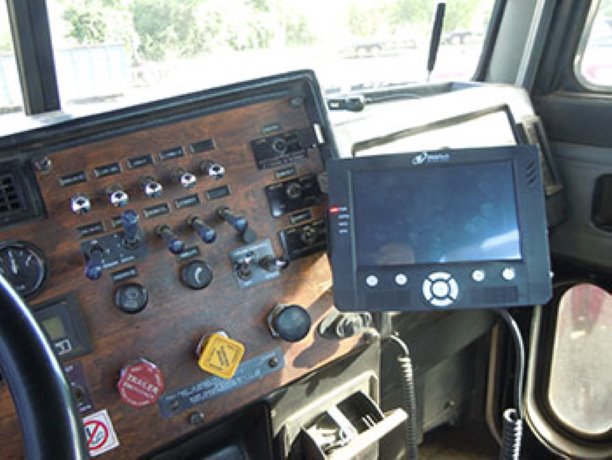When it comes to Global Positioning System (GPS) tracking, what springs to mind is the ability to program and plot the travels of a half-ton or gravel truck.
But, the vice-president of a Vancouver-based company said that GPS fleet tracking can be adapted for a variety of productivity-boosting uses.
“A customer can have a real-time map updated by the minute, reporting exactly the direction, speed and engine information of the vehicle,” said David Greer, marketing VP for Webtech Wireless.
“And, they can go from a reactive maintenance plan to pro-active maintenance, ensuring alternative equipment is in place.”
Webtech’s system involves the installation of an in-vehicle locator that gathers location, telematics and vehicle-diagnostic information.
The locator also receives GPS data, accurate to within a few metres, which together with the vehicle information, is transmitted through cellular networks to web-based servers.
Using secure web space, managers and dispatchers view vehicles in real time.
Costs for each locator vary from about $300 to $1,000 per vehicle.
There’s also a $20 to $40 monthly service charge per unit for the web service.
Greer, who has more than 25 years of experience in the high tech field, said benefits include improved fuel use, enhanced worker safety, lowered vehicle costs, theft prevention, reduced emissions and improved employee productivity.
“It’s that simple and that complicated,” he said.
He cited the example of a 2,600-employee Texas client, involved in pipeline construction and maintenance.
The fast-growing company has more than 1,000 assets, including $500,000 bulldozers and small trailers, spread over a vast area.
During huge projects, staff would tuck heavy equipment in a back corner for their crew, not an efficient use of expensive equipment that could be required elsewhere.
With Webtech, bosses know exact locations of equipment.
“There’s no hoarding. Equipment is actively used,” Greer said.
Another benefit is that equipment use can be tracked, ensuring accurate accounting.
Throughout Alberta and Ottawa, its InterFleet program is used in municipal vehicles to efficiently plow and maintain roads.
One of the most popular features is the speeding report.
At some workplaces, a large monitor, that refreshes every minute, is installed, allowing anyone to see who’s breaking the law.
‘If you’re speeding, it pops up like a balloon,” Greer said.
Company owners and supervisors can be kept awake at night worrying where employees may go.
Staff are driving valuable assets and once they’re on the road, the bosses don’t know what’s going on, he explained.
Fleet tracking delivers peace of mind.
But, Greer admitted that when a company installs GPS fleet tracking, staff resistance surfaces.
“They say they don’t like having Big Brother around,” Greer said.
At private companies, about five per cent of drivers leave the employer, usually the five per cent who have raised suspicions, he said.
But, good drivers and staff actually benefit because fleet tracking proves who gets the work done efficiently and without problems.
Greer recalled an Alberta customer, the CEO of a fracking company, who encountered a speeding driver behind the wheel of his company’s truck.
The CEO immediately called his office and reported the vehicle.
A major Webtech Wireless customer is Mammoet Canada, a company specializing in moving and installing heavy equipment, focussing on the oil and gas industry, civil engineering projects and power generation.
According to company spokesperson Dirk Pauwels, Mammoet started using Webtech’s system in Eastern Canada three years ago and in Western Canada, two years ago.
Mammoet Canada Western has about 560 units installed.
The company installed fleet tracking to improve driver habits, improve safety and to support maintenance with real time equipment hours and location, Pauwels said.
Knowing exactly where each piece of equipment is means the fleet is controlled much more effectively.
“It is a great help for maintenance planning, transport and crane dispatches,” he said.
“Additionally, we want to be prepared for Transport Canada’s transition to electronic log for DOT purposes.”
Since installation, traffic violations have dropped drastically, he added.
While Webtech is a pioneer in GPS fleet tracking, other Canadian companies have entered the field.
Shaw Tracking offers automated hours of service, scanning, navigation, fuel management and critical event reporting.
GPS Tracking Canada touts its ability to streamline routing for contractors, roofers, electricians and other trades.
With a Vancouver office, the company aims to improve scheduling service, record crews’ working hours and travel time thus ensuring staff are accountable.
Vancouver-based Nero Global Tracking has helped Houle Electric reduce fuel consumption, prove that Luso Concrete’s equipment was on-site and used as stipulated and assisted Tyam Construction with auditing time cards, checking vehicles’ after hour use and dispatching mechanics.











Recent Comments
comments for this post are closed